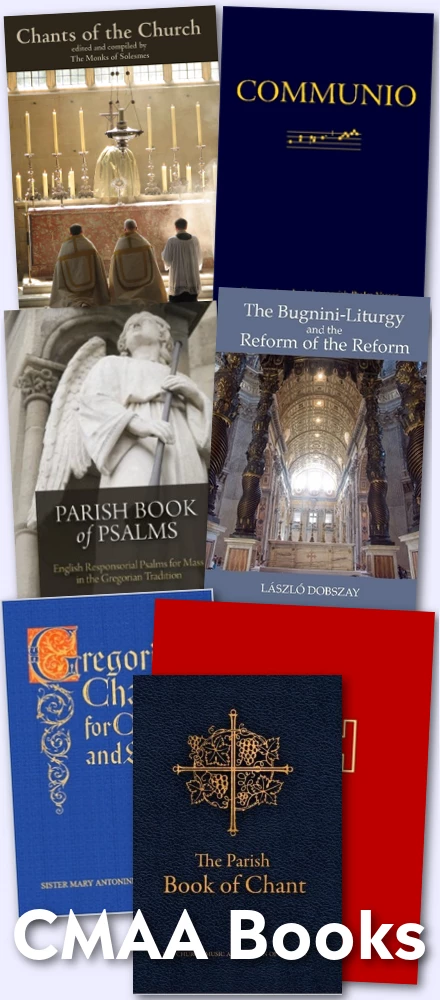An article in the National Catholic Register argues that it is better to have no music at Mass than bad music. That seems right, even granting that the normative Mass is the sung Mass. Silence is very beautiful. Music has to be very good to be better than silence. I'm pleased to see NCR inching toward solid commentary on music.
Years ago, the editor told me that he didn't like chant and didn't want it to come back, and so he would never publish a piece on the subject (it was the beginning of my understanding that "conservative Catholics" can't always be counted on for support for genuine liturgical renewal).
That seems to have changed. Good. And yet what the current article seems not to contemplate is that music for Mass isn't just a matter of making the right choice among many possibilities. The Roman Rite comes with its own music "built in," as it were, and this music is found in the Graduale. If the current generation could somehow come to understand this one point, we would be leagues ahead of where we are.
Tuesday, March 20, 2007
Better no music than bad music
Jeffrey TuckerMore recent articles:
Launching “Theological Classics”: Newman on the Virgin Mary, St Vincent on Novelty & Heresy, Guardini on Sacred SignsPeter Kwasniewski
At a time of turmoil, nothing could be better or more important than rooting ourselves more deeply in the Catholic tradition. One of my favorite quotations is by St. Prosper of Aquitaine (390-455), writing in his own age of chaos: “Even if the wounds of this shattered world enmesh you, and the sea in turmoil bears you along in but one surviving shi...
Low Sunday 2025Gregory DiPippo
With his inquisitive right hand, Thomas searched out Thy life-bestowing side, O Christ God; for when Thou didst enter while the doors were shut, he cried out to Thee with the rest of the Apostles: Thou art my Lord and my God. (The Kontakion of St Thomas Sunday at Matins in the Byzantine Rite.)Who preserved the disciple’s hand unburnt when he drew n...
The Easter Sequence Laudes SalvatoriGregory DiPippo
The traditional sequence for Easter, Victimae Paschali laudes, is rightly regarded as one of the greatest gems of medieval liturgical poetry, such that it was even accepted by the Missal of the Roman Curia, which had only four sequences, a tradition which passed into the Missal of St Pius V. But of course, sequences as a liturgical genre were extre...
The Paschal Stichera of the Byzantine Rite in EnglishGregory DiPippo
One of the most magnificent features of the Byzantine Rite is a group of hymns known as the Paschal stichera. These are sung at Orthros and Vespers each day of Bright Week, as the Easter octave is called, and thenceforth on the Sundays of the Easter season, and on the Leave-taking of Easter, the day before the Ascension. As with all things Byzantin...
Medieval Vespers of EasterGregory DiPippo
In the Breviary of St Pius V, Vespers of Easter Sunday and the days within the octave present only one peculiarity, namely, that the Chapter and Hymn are replaced by the words of Psalm 117, “Haec dies quam fecit Dominus; exsultemus et laetemur in ea. – This is the day that the Lord has made; let us be glad and rejoice therein.” In the Office, this...
Summer Graduate-Level Sacred Music Study - Tuition-freeJennifer Donelson-Nowicka
The May 1st application deadline is approaching for summer graduate courses in sacred music at the Catholic Institute of Sacred Music. Graduate-level study structured for busy schedulesIn-person, intensive course formatsAffordable room & boardFree tuitionLearn more and apply here.Courses:Choral InstituteComposition SeminarOrgan ImprovisationIn...
The Last Service of EasterGregory DiPippo
Following up on Monday’s post about the service known as the Paschal Hour in Byzantine Rite, here is the text of another special rite, which is done after Vespers on Easter day itself. It is brief enough to show the whole of it with just one photograph from the Pentecostarion, the service book which contains all the proper texts of the Easter seaso...
Should Communion Sometimes Be Eliminated to Avoid Sacrilege?Peter Kwasniewski
In a post at his Substack entitled “Nobody is talking about this in the Catholic world,” Patrick Giroux has the courage and good sense to raise the issue of the indiscriminate reception of the Lord at weddings and funerals where many attendees are not Catholics, or, if Catholics, not practicing, not in accord with Church teaching, or not in a state...
Update on the Palestrina500 Festival in Grand RapidsPeter Kwasniewski
On Friday, February 14th, the feast of Saint Valentine, Sacred Heart of Jesus Parish in Grand Rapids, MI welcomed Gesualdo Six from London to sing a choral meditation and Mass for the parish's yearlong Palestrina500 festival.The choral meditation consisted of:Palestrina: Litaniae de Beata Virgine Maria a6Antoine Brumel: Sub tuum praesidiumJosquin d...
Catholic Education Foundation Seminar 2025: The Role of the Priest in Today’s Catholic SchoolDavid Clayton
July 16-18, at the Athenaeum of Ohio (the seminary of the Archdiocese of Cincinnati).Fr Peter Stravinskas of the Catholic Education Foundation is once again offering this excellent three-day seminar, intended primarily for bishops, priests, and seminarians. It is entitled The Role of the Priest in Today’s Catholic School.For further information: c...




















